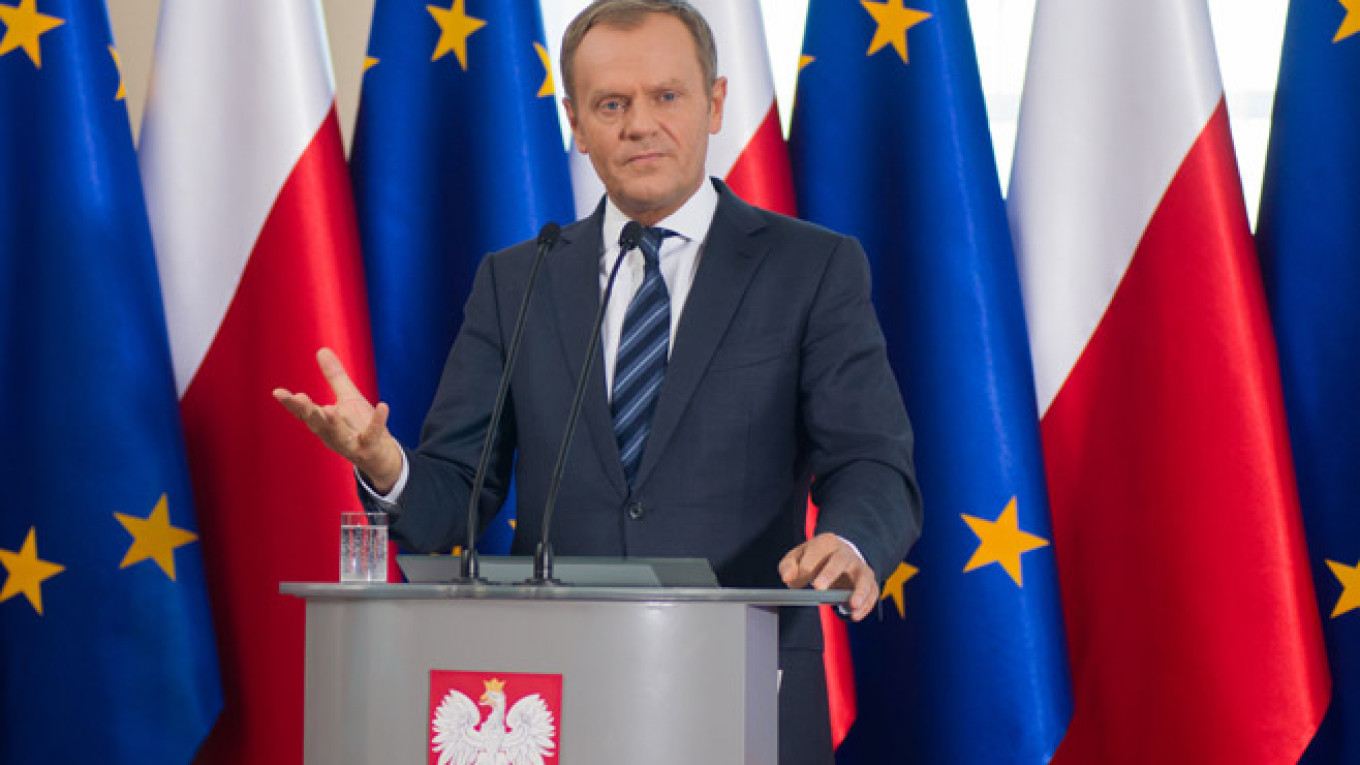Energy politics may ultimately define the shape of relations between Russia and the West during this latest crisis in Ukraine. Fears of a cold European winter without adequate amounts of natural gas from Russia are outweighing U.S.-led pressure for tougher sanctions against Moscow.
Nearly a third of Europe's gas comes from Russia, most of it via Ukraine. The prospect of price wars — or worse, disruptions in flow — has motivated Europe to lessen its dependence on Russian energy. Two events this past summer underscored the urgency of the matter.
In mid-June, Brussels, Kiev and Moscow failed to settle a massive dispute over the price of gas that Russia sells to Ukraine — a dispute that reached acute levels in April when Russia raised its prices for Ukraine from $268.50 per 1,000 cubic meters to $485.50, an 80 percent hike. Shortly thereafter, an explosion ripped apart a gas pipeline in central Ukraine.
To help safeguard the continent's energy supplies from shocks like these, the European Commission published a new energy security strategy in July. Its recommendations range from regional "stress tests" and new gas infrastructure projects to enhanced storage facilities. While these can help, observers say European weakness in the energy market is fundamentally rooted in internal divisions. "If only Europe could speak with one voice," this thinking goes, "it could wean itself from Moscow."
The impulse for a unified energy policy may be politically appealing, but it would be economically disastrous. It is built on a faulty conclusion that forming an energy union, or in other words, creating an EU-wide gas monopoly based in Brussels, is the right way to go.
Unfortunately, the recent election of Polish President Donald Tusk to the presidency of the European Council may grant this idea the necessary political support. Tusk wants the EU to jointly negotiate gas contracts with Russia, for the contracts to have no secret clauses, and for the European Commission to play a role in all future energy talks with Moscow. Despite the severity of the crisis in Ukraine, such a proposal should be treated for what it is, namely dangerous nonsense. Here's why:
1. It will take us far from a competitive and free market:
Given the differences between EU member states in their energy mixes, taxes and regulations that result from their past national choices, having a common external energy policy with its super-center in Brussels is practically unattainable. What's more, making Brussels the sole negotiator of gas contracts blatantly contradicts the European Commission's own attempts to create a liberalized internal gas market. Nonetheless, the proposal has gained ground because it plays into some EU bureaucrats' long-term aspirations to increase their political power in external energy policy.
2. It will challenge the EU's climate goals:
Tusk recently wrote in The Financial Times that "an energy union would be based on solidarity and common economic interests." Yet just a few lines later, he claims that Europe should "make full use of the fossil fuels available, including coal and shale gas." Under Tusk's watch, Poland has almost exclusively relied on coal for electricity production and has consistently lobbied to uphold the status of coal in the EU energy mix. Coal is the most polluting fossil fuel in terms of carbon dioxide emissions. Plans for burning more coal in the future stand in stark contradiction to the EU Commission's roadmap for cutting greenhouse gas emissions 80 percent by 2050. Now as the head of the EU, Tusk may well advance his domestic political agenda under the disguise of a prudent European response to expansionist Russia.
3. It rests on a false assumption that the U.S. or Australia can resolve Europe's energy security dilemmas:
It is time to put to rest the myth that by somehow quickly contracting gas from the U.S. and Australia, European dependence on Russian gas would be alleviated. Contrary to popular belief, European LNG infrastructure will not allow imports to replace Russian gas in Eastern and Central Europe. This myth tends to overlook difficulties on both sides of the Atlantic.
To help its allies, America would have to overcome a domestic lobby that thinks that restricting exports will keep prices at home low. And even assuming that this hurdle is removed, exports would flow mainly to Asia, where American producers can strike the highest profits. Choosing Europe over Asia would require significant political intervention and is highly unlikely to occur only on commercial grounds.
There are problems in Europe too. All currently operational LNG import terminals are located in Western and Southern Europe. Thus, even if American LNG could strengthen Europe's bargaining position, it would not rescue Ukraine or free Eastern Europe from Russian gas. Because LNG prices are higher in Asia, producers are ignoring geopolitics and shipping gas there. Russia's relatively cheap gas is therefore likely to remain competitive in the European market for the foreseeable future.
4. It will boost the EU's "benign" technocracy:
Different energy mixes across Europe are a result of the varied historical and geographical conditions in these regions. Gas contracts reflect these national preferences, leading to a plethora of European standpoints vis-a-vis Russia. But an attempt to strengthen the overall contractual relationship with Russia by building an energy union can only make matters worse. In Europe, private companies negotiate energy deals. If the declared goal of the commission's policy is free competition, then the European companies should be allowed to compete for the best deals with energy producers.
But most importantly, Tusk's suggestion that the European Commission negotiate gas contracts on behalf of the bloc is beyond the commission's jurisdiction. How and why should a multifaceted bureaucracy be entitled to clinch energy deals on behalf of 28 member states? Would Tusk be democratically accountable for such deals? This could be benign technocracy, at best, but not democracy.
Tusk and his collaborators should perhaps come to terms with the fact that even as Europe diversifies, Russia will remain by far Europe's most important gas supplier. In the same vein, Russia will diversify its export markets, but Europe will remain its most lucrative customer. All the same, energy dependence on a revanchist Russia will remain one of the EU's biggest foreign policy headaches in the foreseeable future.
What can be done? Europeanization of energy should continue step-by-step, first by reaching the objective of a liquid internal gas market. Excessive energy politicization should not be Europe's answer to current challenges. Amid Europe's existential crisis, a central purchasing body for gas is democratically unaccountable, and it undermines the union's traditional role as a steward of economic principles such as consumer choice, open markets and vigorous competition.
Morena Skalamera is a postdoctoral fellow conducting research on energy at Harvard's Belfer Center.
A Message from The Moscow Times:
Dear readers,
We are facing unprecedented challenges. Russia's Prosecutor General's Office has designated The Moscow Times as an "undesirable" organization, criminalizing our work and putting our staff at risk of prosecution. This follows our earlier unjust labeling as a "foreign agent."
These actions are direct attempts to silence independent journalism in Russia. The authorities claim our work "discredits the decisions of the Russian leadership." We see things differently: we strive to provide accurate, unbiased reporting on Russia.
We, the journalists of The Moscow Times, refuse to be silenced. But to continue our work, we need your help.
Your support, no matter how small, makes a world of difference. If you can, please support us monthly starting from just $2. It's quick to set up, and every contribution makes a significant impact.
By supporting The Moscow Times, you're defending open, independent journalism in the face of repression. Thank you for standing with us.
Remind me later.






